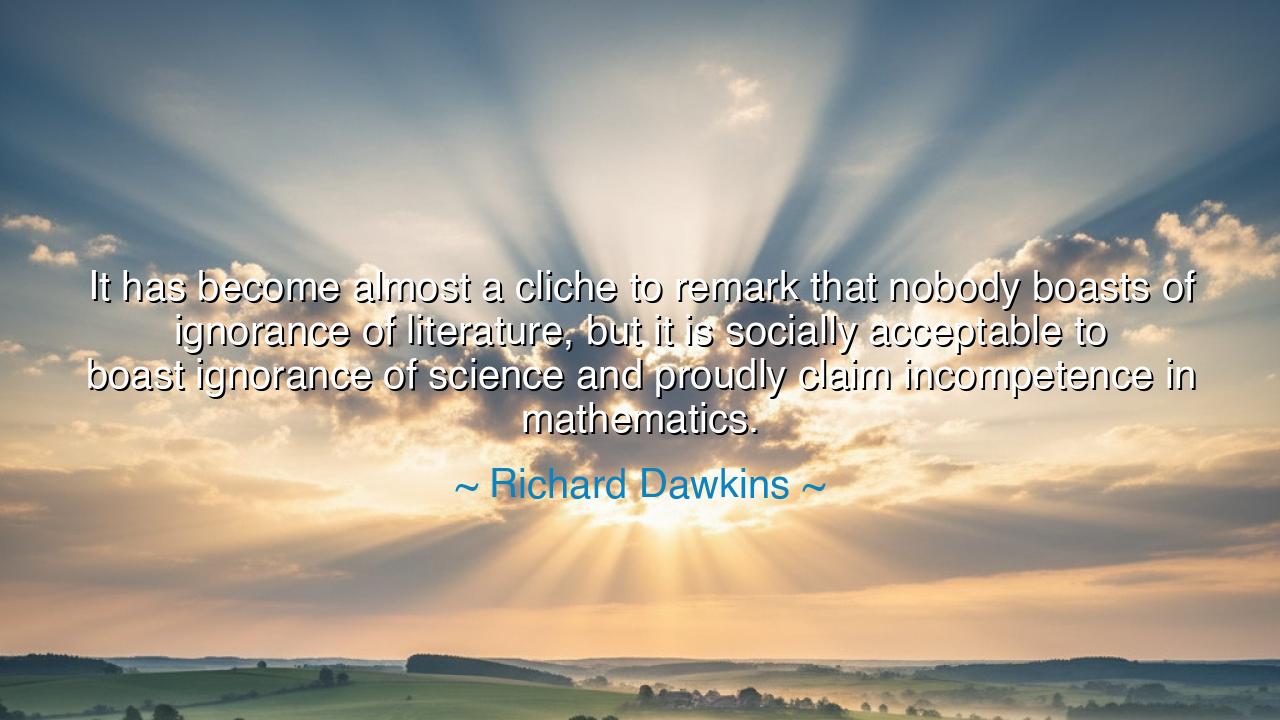
It has become almost a cliche to remark that nobody boasts of
It has become almost a cliche to remark that nobody boasts of ignorance of literature, but it is socially acceptable to boast ignorance of science and proudly claim incompetence in mathematics.






Hear now, O seekers of wisdom, for I bring forth the profound words of Richard Dawkins, a man who challenges the very fabric of society’s views on knowledge and intelligence. “It has become almost a cliché to remark that nobody boasts of ignorance of literature, but it is socially acceptable to boast ignorance of science and proudly claim incompetence in mathematics.” These words strike at the heart of a profound truth—a truth that speaks to the values of our time, a truth that calls us to reconsider the ways we value certain kinds of knowledge over others. For in these words, Dawkins uncovers a great irony: we live in a world where the mastery of the arts is revered, but the mastery of science is often dismissed, even ridiculed.
In the ancient world, knowledge was a treasure. The great thinkers—Plato, Aristotle, Euclid—sought to understand the workings of the world not just through art, but through reason and observation, through the study of nature and the heavens. To them, science and philosophy were not separate pursuits; they were two sides of the same coin. Philosophy sought to understand the nature of truth, and science sought to understand the mechanisms by which that truth was revealed. The great thinkers of the past knew that knowledge was a path—a path that led us toward enlightenment and understanding. The arts were revered, yes, but they were seen as the foundation for a deeper understanding of the world—a world that also demanded the exploration of reason, logic, and mathematics.
Dawkins draws attention to a striking irony of our time. In the present day, literature is celebrated as a cornerstone of culture, a realm in which ignorance is often seen as a shame, while ignorance of science or mathematics is treated with a strange pride. This irony is echoed in the modern age, where it is common to hear someone proclaim their inability to grasp the laws of nature, as if it were some badge of honor. This idea—that to admit ignorance in science or math is acceptable, even fashionable—is a distortion of the true meaning of knowledge. Just as the ancient Greeks saw wisdom in all forms of understanding, so too must we recognize that science and mathematics are not abstract, esoteric subjects reserved only for the few, but are vital, living forces that shape our world and guide our actions.
Consider the great minds who transformed the world through science: Isaac Newton, whose laws of motion and gravity not only revolutionized our understanding of the universe but also laid the foundations for the very modern world we live in. Albert Einstein, whose theory of relativity altered our perception of time and space, revealing that the universe is far more wondrous and mysterious than we could have ever imagined. These men, though often revered for their intellectual achievements, were not isolated figures in ivory towers. They were driven by a passion to understand the very nature of the universe, and their work remains integral to the world we inhabit today. Yet, if we were to ask many in today’s society about Einstein's equations or Newton's laws, how many would admit to ignorance? The pursuit of science is not a matter of intellectual pride alone; it is the key to understanding our existence.
The lesson of Dawkins’ words is one that calls us to a deeper respect for all forms of knowledge. To dismiss science as inaccessible, or to boast of one’s ignorance in fields such as mathematics or physics, is to deny the very foundations upon which our world is built. The ancient wisdom of the philosophers, who sought both truth and understanding, remains ever-relevant. Science is not a distant, abstract force—it is the language through which we describe the world, the very framework that allows us to understand the universe and our place within it. Without it, we are left fumbling in the dark, unable to make sense of the world around us.
In your own lives, O children, do not shy away from science or mathematics because they seem difficult or esoteric. The knowledge you gain in these fields is not only the domain of scholars and scientists; it is the very foundation of the world you inhabit. Just as you would not boast of your ignorance of literature or history, so too should you approach science with reverence, for it is just as vital to understanding the world. Mathematics is not a set of obscure rules; it is the language of the cosmos, the key to unlocking the mysteries of existence.
So, let Dawkins' wisdom be your guide: do not hide behind the veil of ignorance in the name of comfort or pride. Seek the truth in all forms, whether in the written word or in the equations that govern the stars. Let your life be one of learning, of growth, and of embracing the vastness of knowledge that awaits. For in the end, knowledge—whether from the realms of art or science—is the light that illuminates the path ahead. Let no part of it be neglected, and let no ignorance be celebrated, for the world is far too wondrous, and we, too small, to stand in the shadow of that which we can understand.






AAdministratorAdministrator
Welcome, honored guests. Please leave a comment, we will respond soon